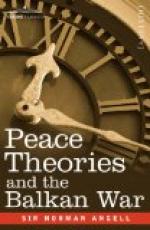not in return for any work of administration,
but simply because he was the stronger. And that
has made his rule intolerable, and is the cause
of this war.
Now, my whole thesis is that understanding, work, co-operation, adjustment, must be the basis of human society; that conquest as a means of achieving national advantage must fail; that to base your prosperity or means of livelihood, your economic system, in short, upon having more force than someone else, and exercising it against him, is an impossible form of human relationship that is bound to break down. And Mr. Chesterton says that the war in the Balkans demolishes this thesis. I do not agree with him.
The present war in the Balkans is an attempt—and happily a successful one—to bring this reign of force and conquest to an end, and that is why those of us who do not believe in military force rejoice.
The debater, more concerned with verbal consistency than realities and the establishment of sound principles, will say that this means the approval of war. It does not; it merely means the choice of the less evil of two forms of war. War has been going on in the Balkans, not for a month, but has been waged by the Turks daily against these populations for 400 years.
The Balkan peoples have now brought to an end a system of rule based simply upon the accident of force—“killing and being killed.” And whether good or ill comes of this war will depend upon whether they set up a similar system or one more in consonance with pacifist principles. I believe they will choose the latter course; that is to say, they will continue to co-operate between themselves instead of fighting between themselves; they will settle differences by discussion, adjustment, not force. But if they are guided by Mr. Chesterton’s principle, if each one of the Balkan nations is determined to impose its own especial point of view, to refuse all settlement by co-operation and understanding, where it can resort to force—why, in that case, the strongest (presumably Bulgaria) will start conquering the rest, start imposing government by force, and will listen to no discussion or argument; will simply, in short, take the place of the Turk in the matter, and the old weary contest will begin afresh, and we shall have the Turkish system under a new name, until that in its turn is destroyed, and the whole process begun again da capo. And if Mr. Chesterton says that this is not his philosophy, and that he would recommend the Balkan nations to come to an understanding, and co-operate together, instead of fighting one another, why does he give different counsels to the nations of Christendom as a whole? If it is well for the Balkan peoples to abandon conflict as between themselves in favour of co-operation against the common enemy, why is it ill for the other Christian peoples to abandon such conflict in favour of co-operation against their common enemy, which is wild nature and human error, ignorance and passion.
[Footnote 5: From “Everyman” to whose Editor I am indebted for permission to print my reply.]




